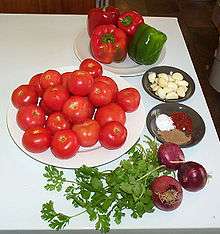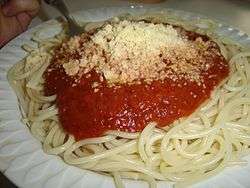Tomato sauce
|
| |
| Type | Sauce |
|---|---|
| Main ingredients | Tomatoes |
| Variations | Arrabbiata sauce |
|
| |
Tomato sauce (also known as Neapolitan sauce, and referred to in Italy as Napoletana sauce), refers to any of a very large number of sauces made primarily from tomatoes, usually to be served as part of a dish (rather than as a condiment). Tomato sauces are common for meat and vegetables, but they are perhaps best known as sauces for pasta dishes.
Tomatoes have a rich flavor, high liquid content, very soft flesh which breaks down easily, and the right composition to thicken into a sauce when they are cooked (without the need of thickeners such as roux). All of these qualities make them ideal for simple and appealing sauces. The simplest tomato sauces consist just of chopped tomato flesh cooked in a little olive oil and simmered until it loses its raw flavor, and seasoned with salt.
Optionally tomato skins may be scalded and peeled according to texture (especially thicker pelati paste varieties) and tomato seeds may be removed to avoid their bitterness.
Water (or another, more flavorful liquid such as stock or wine) is sometimes added to keep it from drying out too much. Onion and garlic are almost always sweated or sautéed at the beginning before the tomato is added. Other seasonings typically include basil, oregano, parsley, and possibly some spicy red pepper or black pepper. Ground or chopped meat is also common. In countries such as the United Kingdom, Australia, New Zealand, and South Africa, the term "tomato sauce" is used to describe a condiment type table sauce similar to that known in the United States as "ketchup".[1] In some of these countries, both terms are used for the condiment.
The use of tomato sauce with pasta appears for the first time in the Italian cookbook L'Apicio moderno, by Roman chef Francesco Leonardi, edited in 1790.[2]
French
Sauce tomate is one of the five mother sauces of classical French cooking, as codified by Auguste Escoffier in the early 20th century. It consists of salt belly of pork, onions, bay leaves, thyme, tomato purée or fresh tomatoes, roux, garlic, salt, sugar, and pepper. Many times, butter and flour will be listed in the ingredients, but those are only used to make the roux (thickening agent). Roux is made of equal parts by weight of flour and butter cooked. Any extra flour or butter that is called for in the recipe is typically an error.[3]
Italian

The misconception that the tomato has been central to Italian cuisine since its introduction from the Americas is often repeated. Though the tomato was introduced from the Spanish New World to European botanists in the 16th century, tomato sauce made a relatively late entry in Italian cuisine: in Antonio Latini's cookbook Lo scalco alla moderna (Naples, 1692).[4]
Latini was chef to the Spanish viceroy of Naples, and one of his tomato recipes is for sauce alla spagnuola, "in the Spanish style". The first known use of tomato sauce with pasta appears in the Italian cookbook L'Apicio moderno, by Roman chef Francesco Leonardi, edited in 1790.
Italian varieties of tomato sauce range from the very simple pasta al pomodoro to the piquant puttanesca and arrabbiata sauces. Tomato sauce with pasta can stand on its own or it can also be paired with ingredients such as Italian sausage, shrimp, meatballs or vegetables, for a more lively pasta dish.
Mexican
Tomato sauce was an ancient condiment in Aztec food. The first western person to write of what may have been a tomato sauce was Bernardino de Sahagún, who made note of a prepared sauce that was offered for sale in the markets of Tenochtitlan (Mexico City today). Spaniards later brought the use of tomatoes to Europe.
Basic Mexican tomato sauces are tomato sauce (salsa de tomate rojo o jitomate) and green sauce (salsa de tomate verde). The tomato sauce is stock for spicy sauces and moles.
Britain, Australia, New Zealand and South Africa
The most common use of the term tomato sauce in Australia, New Zealand, South Africa and the United Kingdom is to describe a popular, commercially produced condiment, that is a type of Table Sauce, essentially identical to American ketchup, typically applied to foods such as meat pies, sausages, other cooked meat, (in particular Steak) and potato chips.[5] Tomato-based sauces served with pasta would commonly be referred to as "pasta sauce" or "Napoletana sauce".
In the UK the meaning of the term "tomato sauce" depends on the context; on a restaurant menu the phrase "in a tomato sauce" means a freshly prepared tomato based sauce as used on pasta, and colloquially it may refer to either the pasta sauce or American ketchup.
United States


In the U.S., "tomato sauce" refers to two distinct sauces. One is a tomato concentrate with salt and minimal herbs, used in cooking. This product is considered incomplete and not normally used as is. Related ingredients are tomato purée and tomato paste, each of which is similar but of a thicker consistency. Tomato purée and tomato paste have FDA standards of identity (since 1939) for percentage of tomato solids, and generally do not contain seasonings other than salt; tomato sauce is nonstandardized.[6]
The second use of the term "tomato sauce" in the U.S. is for a cooked sauce of tomatoes, usually containing olive oil and garlic. This type of tomato sauce is generally served with pasta, and sometimes with meat. Less commonly, it is served with chicken or beef alone. One popular variety of tomato sauce is marinara sauce, an Italian-American term for a simple tomato sauce with herbs—mostly parsley and basil.
Contrary to what the name might suggest ('marinara' is Italian for "sailor-style") it is without anchovies, fish, or seafood. In Italy, marinara refers either to sauces made with tomato and garlic (as in pizza marinara) or to seafood-based sauces or foods; in this case, the name does not imply that tomato is either included or excluded.
Some Italian Americans on the East Coast and around the Chicago area refer to tomato sauce as "gravy", "tomato gravy", or "Sunday gravy", especially sauces with a large quantity of meat simmered in them, similar to the Italian Neapolitan ragù. The term "Sunday gravy" derives from the Italian tradition of having a large, family dinner on Sunday afternoons. "Gravy" is an erroneous English translation from the Italian sugo which means juice, but can also mean sauce (as in sugo per pastasciutta).[7]
The expression for "gravy" in Italian is sugo d'arrosto, which is literally "juice of a roast" and is not specifically tomato sauce.[8] Sicilian Americans in communities like Buffalo and Rochester, New York use the terms "sarsa" and "succu" interchangeably for tomato sauces of all types used with pasta, and "gravy" only in reference to brown meat gravies.
American supermarkets commonly carry a variety of prepared tomato sauces described as "spaghetti sauce" or "pasta sauce." Common variations include meat sauce, marinara sauce, and sauces with mushrooms or sweet red peppers.
 A can of tomato paste
A can of tomato paste
Louisiana
A spicy tomato sauce known as sauce piquante is common in Louisiana Cajun cuisine, that can contain any seafood, poultry, or meats such as wild game. It is typically served over white rice. In Louisiana Creole cuisine, there is a tomato sauce known as a Creole sauce. It is similar to Italian tomato sauce, but features more Louisiana flavors derived from the fusion of French and Spanish cooking styles. They both usually contain the traditional holy trinity of diced bell pepper, onion, and celery.
Tomato gravy
Tomato gravy is distinct from the term as used by Italian Americans when referring to a type of tomato sauce particularly where tomatoes were a staple food. The cooked tomatoes, some fat (usually cured pork fat) and flour are cooked together until thick, and seasoned with salt and pepper. Onions or bell peppers may be added as well. Typically, tomato gravy is served over pasta. It is also eaten largely by Creole people in the Southern United States, who eat it over rice.
Indian
Some Indian curries, such as chicken tikka masala, have a tomato based sauce, as do many vegetarian style dishes.
See also
References
- ↑ "traditional aussie meat pie with ketchup (or tomato sauce, as they would say) - perth - Australia - Leah Down Under - WorldNomads Adventures". Journals.worldnomads.com. Retrieved 2010-11-17.
- ↑ L'Arte della cucina in Italia, Emilio Faccioli, Einaudi, Milano, 1987
- ↑ Auguste Escoffier, The Complete Guide to the Art of Modern Cookery (New York: Wiley, 1979), 9–10.
- ↑ Elizabeth David, Italian Food (1954, 1999), p 319, and John Dickie, Delizia! The Epic History of the Italians and Their Food, 2008, p. 162.
- ↑ "Tucker". Australianbeers.com. Retrieved 2010-11-17.
- ↑ "Contadina – Tips & Advice – Contadina FAQs". Contadina.com. Retrieved 2010-11-17.
- ↑ Love, C., Webster's New World Italian Dictionary, Concise Edition (Macmillan 1991) ISBN 0-13-953639-6
- ↑ Love, C., Webster's New World Italian Dictionary, Concise Edition (Macmillan 1991) ISBN 0-13-953639-6
External links
| Wikimedia Commons has media related to Tomato sauce. |
| Wikibooks Cookbook has a recipe/module on |
- The Cook's Decameron: A Study In Taste, Containing Over Two Hundred Recipes For Italian Dishes from Project Gutenberg. This is from a very old source, and reflects the cooking at the turn of the 20th century.
- Classic, authentic Italian "Sunday Gravy"
- Italian tomato sauce recipe

